Hydraulics
Hydraulics is a branch of science and engineering that deals with the mechanical properties of liquids and their applications in engineering and technology. It focuses on the behavior of fluids, especially water and oil, and how they can be used to generate, control, and transmit power.
Key Concepts in Hydraulics
- Pascal's Law: This law states that when pressure is applied to a fluid in a closed system, the pressure is transmitted equally in all directions.
- Hydraulic Systems: These are systems that use liquid to transmit power. They typically consist of a reservoir, pump, valves, and actuators.
- Hydraulic Machines: These are devices that utilize hydraulic power to perform work, such as hydraulic lifts, jacks, and brakes.
- Hydraulic Fluids: The liquids used in hydraulic systems, such as oil or water, which are chosen based on their specific properties and the requirements of the system.
- Hydraulic Pressure: The force exerted by the fluid on the walls of its container, which determines the amount of work that can be done by the hydraulic system.
Applications of Hydraulics
Hydraulics is used in a wide range of applications, including:
- Heavy machinery and construction equipment
- Automotive systems, such as power steering and braking systems
- Aircraft and aerospace technology
- Marine and offshore systems, including ship steering and loading equipment
- Civil engineering, including the operation of dams and bridges
Study Guide for Hydraulics
To study hydraulics effectively, it is important to understand the basic principles and their practical applications. Here are some key topics to focus on:
- Learn about Pascal's Law and its implications for hydraulic systems.
- Understand the components of a hydraulic system and how they work together to transmit power.
- Explore the different types of hydraulic machines and their functions.
- Study the properties of hydraulic fluids and their selection criteria.
- Examine real-world examples of hydraulic applications in various industries.
- Practice solving problems related to hydraulic pressure, force, and work done by hydraulic systems.
By mastering these concepts, you will develop a solid understanding of hydraulics and its significance in engineering and technology.
.◂Science Worksheets and Study Guides Eighth Grade. Organic compounds
Study Guide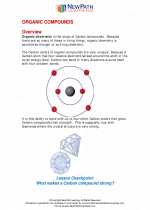 Organic compounds
Organic compounds  Worksheet/Answer key
Worksheet/Answer key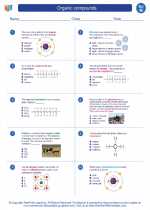 Organic compounds
Organic compounds  Worksheet/Answer key
Worksheet/Answer key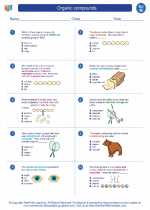 Organic compounds
Organic compounds  Worksheet/Answer key
Worksheet/Answer key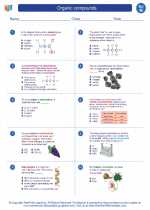 Organic compounds
Organic compounds  Vocabulary/Answer key
Vocabulary/Answer key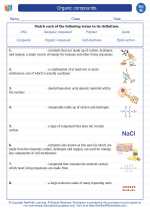 Organic compounds
Organic compounds  Vocabulary/Answer key
Vocabulary/Answer key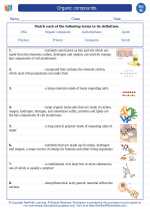 Organic compounds
Organic compounds 

 Worksheet/Answer key
Worksheet/Answer key
 Worksheet/Answer key
Worksheet/Answer key
 Worksheet/Answer key
Worksheet/Answer key
 Vocabulary/Answer key
Vocabulary/Answer key
 Vocabulary/Answer key
Vocabulary/Answer key

The resources above cover the following skills:
Physics: Students will use scientific skills and processes to explain the interactions of matter and energy and the energy transformations that occur.
Thermodynamics: Identify and explain that heat energy is a product of the conversion of one form of energy to another.
Identify and describe the various forms of energy that are transformed in order for systems (living and non-living) to operate: Chemical - Flashlight-Light; Mechanical - Pulleys-Motion; Solar/Radiant - Solar calculator; Chemical - Plant cells.